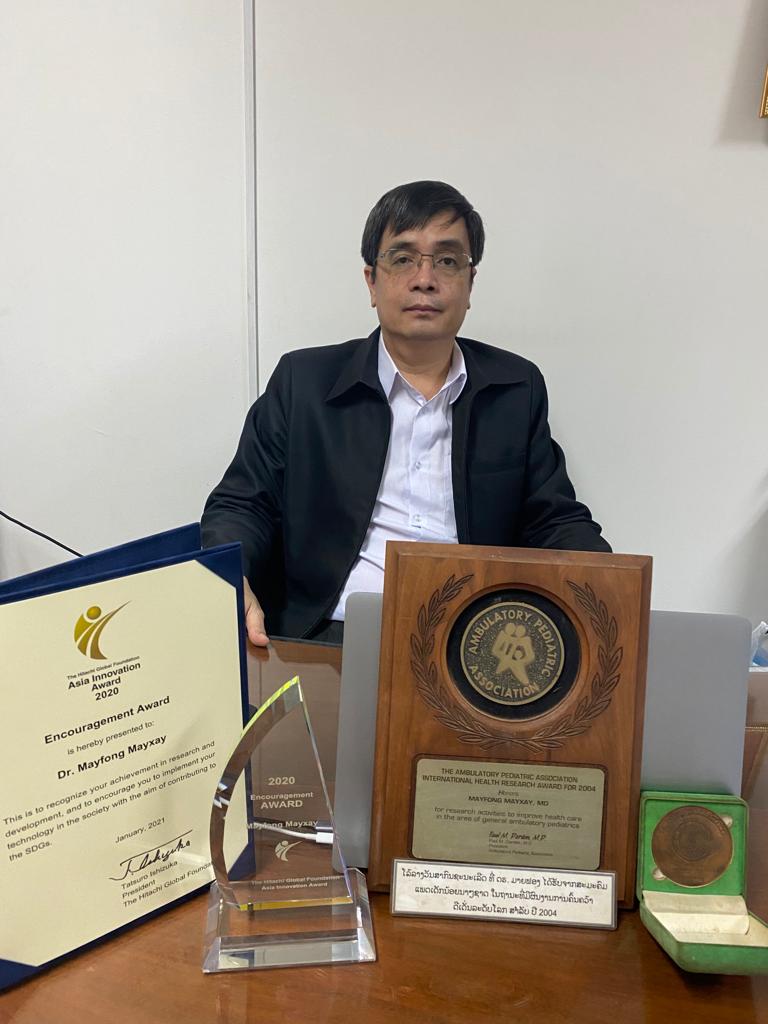Lao Researchers Find New Clues To Elimination Of Malaria
Source: Vientiane Times
Lao researchers have discovered a new method that has the potential to speed up the elimination of malaria worldwide, bringing new hope to global efforts to fulfil the Sustainable Development Goals (SDGs).
The research team leader in Laos, Prof. Mayfong Mayxay, told Vientiane Times last week that a team from the Lao-Oxford-Mahosot Hospital-Wellcome Trust Research Unit in Vientiane and the Mahidol-Oxford Research Unit in Bangkok, Thailand, had come up with new research findings that had the potential to eliminate malaria.
According to the findings, use of the antimalarial drugs dihydroartemisinin-piperaquine and primaquine among an entire population regardless of whether or not they have malaria, “known as Mass Drug Administration (MDA)”, to clear malaria sources could potentially eliminate the disease.

Prof. Mayfong has received several other international awards over the past years.
Experiments showed that MDA was safe, well tolerated, achieved high population coverage and adherence, and had a substantial impact on malaria reduction therefore might be a useful tool to accelerate malaria elimination, the research findings highlighted.
Although the availability of a malaria vaccine has recently been announced, the World Health Organisation recommends its use only among children in sub-Saharan Africa and in other regions with moderate to high falciparum malaria transmission. The vaccine can be used to prevent people from getting malaria but does not eliminate the disease.
According to Prof. Mayfong, ending malaria by 2030 is one of the targets set in the SDGs, which apply to numerous countries including Laos. Eliminating malaria means wiping out malaria drug-resistance and getting rid of the parasite in people with malaria who are not ill, as this group is an important source of disease spread if they are not treated.
Drawing from this initial success in Laos, future malaria control and elimination programmes elsewhere, particularly in malaria countries where the majority of very poor people live, may become successful as well. This will, therefore, contribute to fulfilling the SDG-related concept of “leaving no one behind”, he said.
Prof. Mayfong, who also serves as Vice President of the University of Health Sciences and is a member of the National Assembly, gave an interview to the Vientiane Times last week after receiving an Encouragement Award under the Hitachi Global Foundation Asia Innovation Award 2020.
The Hitachi Global Foundation, which offers awards to promote research in Asia, initially planned to hold an official ceremony to present the Asia Innovation Award 2020 to 12 recipients in Tokyo in January this year. But it decided to cancel the ceremony because of the Covid-19 pandemic and instead sent the awards to the winners by post.
“As a researcher and lecturer in the field of medicine, I am very pleased, honoured and humbled to be given this prestigious innovation award. This achievement is not only mine but also of the whole research team at the Lao-Oxford-Mahosot Hospital-Wellcome Trust Research Unit (LOMWRU) at Mahosot Hospital and the Mahidol-Oxford Research Unit (MORU) in Bangkok,” Prof. Mayfong said.
“The award not only encourages me to carry out further research to benefit the health of the Lao people but will hopefully inspire young people in Laos to become interested in research work,” he added.
Prof Mayfong said malaria was a very old but life-threatening communicable disease. It is a disease of poverty and results in poverty and has infected more than 200 million people and claims at least 400,000 deaths worldwide each year.
Ending malaria saves lives and unlocks human potential. Investing in malaria prevention and elimination means investing in healthier and more prosperous societies, he added.
“Our research work potentially contributes to achieving the Sustainable Development Goals (SDGs) – including ending poverty and hunger, improving health and well-being, and ensuring quality education. By applying and piloting our research findings, we may be able to eliminate malaria from Laos, from the Asean region and elsewhere by 2030 and that all of us will be living in a free-malaria world one day in the future,” Prof Dr Mayfong said concerning the implications of the research.
Prof. Mayfong is an outstanding researcher in the field of medicine. This is not the only award he has received that recognises his international standing as a successful researcher. In 2004, he was awarded the Ambulatory Pediatric Association International Research Award from the Ambulatory Pediatric Association, USA.
In 2010 he received a Medal for Distinguished Research Service from Mahidol University, Thailand. He was also recently named a Visiting Professor by Oxford University’s Medical Science Board.
Prof. Mayfong’s particular research interests include antimalarial drug resistance and antimicrobial resistance, causes of fever, sepsis, dengue, rickettsial infections, melioidosis, leptospirosis, Japanese encephalitis virus infection and infantile beriberi.
He has published 193 papers, which are indexed in PubMed. Each year, he supervises 15-20 medical, Master’s and PhD students’ theses, as well as those written by residents and fellows.


